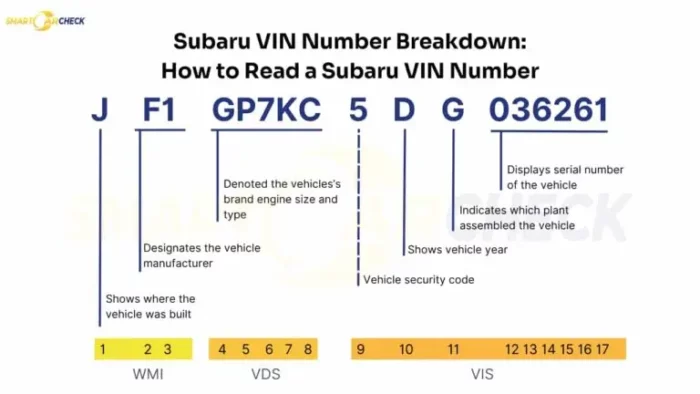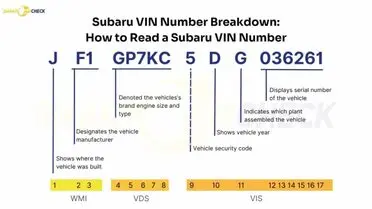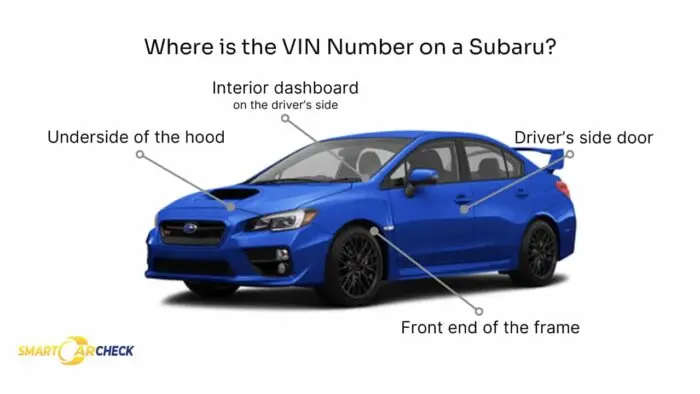- Lowest price check
- Great Customers Review
- Fast and Accurate
- Lowest price check
- Great Customers Review
- Fast and Accurate
Decode Your Subaru’s History and Specs
Use our FREE Subaru VIN decoder to look up the Subaru’s specifications, including the year, make, model, engine specs, weight, transmissions, and history records in seconds.
What is Subaru VIN Decoder?
The Subaru VIN decoder gives access to detailed vehicle specs by breaking down the Vehicle Identification Number. Once the VIN is decoded, you can get the information on the vehicle’s manufacturer, model, engine, transmission types, and more. It helps you identify the car’s specs, track its history, and verify its authenticity.
How to Decode a Subaru VIN?


The VIN is a unique identifier for each car and contains essential information about the vehicle you must know before buying or selling. The VIN allows you to identify the manufacturer, the car part’s assembly location, and the unique car’s identifier, which are encoded directly on the VIN.
The letters I, O, and Q are never used in these codes because they can look like the numbers 1 and 0.
Subaru JDM VIN vs. Standard Subaru VIN – What’s the Difference?
Not all Subaru VINs follow the same rules. Vehicles made for the Japanese Domestic Market (JDM) often use non-standard VIN formats, typically shorter than the 17-character international format used in North America, Europe, and other global markets. Instead, JDM Subarus may rely on chassis codes like GC8 or GF8, which traditional VIN check tools can’t decode.
These differences matter, especially for importers or enthusiasts trying to verify a JDM vehicle’s specs, origin, or history.
- Feature
- Name
- Format
- Purpose
- JDM Subaru
- Frame Number (or Chassis Number)
- Shorter alphanumeric code
- Primarily identifies the vehicle within Japan
- Global Market Subaru
- Vehicle Identification Number (VIN)
- Standard 17-digit VIN
- Standardized code used globally for identification and vehicle history
The Art of Subaru VIN Decoding
A vehicle identification number (VIN) is a 17-character string that consists of letters and numbers. It’s divided into three parts; each section gives specific information about the car. Here’s how it works:
- World Manufacturer Identifier (WMI) (Characters 1–3): This part tells who made the vehicle and in what country.
- Vehicle Descriptor Section (VDS) (Characters 4–9): Represents the car’s model, engine type, and body style.
- Vehicle Identifier Section (VIS) (Characters 10–17): You’ll find the model year, where the car was built, and its unique serial number.
Let’s break it down so it’s easier to understand.
1st Character:
Identifies the country of manufacture of the vehicle. Here are some examples:
1 or 4
2
3
J
K
S
W
Z
USA
Canada
Mexico
Japan
Korea
England
Germany
Italy
2nd Character:
This identifies the specific manufacturer. Some common ones are mentioned below.
- WMI Code
- 4S3
- JF1
- JF2
- 4S4
- Manufacturer
- Subaru
- Subaru
- Subaru
- Subaru SUV/MPV
- Country
- USA
- Japan
- Japan
- USA
3rd Character
This digit shows the type of vehicle or the division that made the vehicle. For example, A, S, X, or one might mean cars, SUVs, or MPVs.
4th to 8th Characters
These numbers and letters detail the vehicle’s body, engine, model, and series.
9th Character
This check digit is used to check the VIN’s authenticity, and it might be a number or a letter.
10th Character:
The tenth character refers to the vehicle’s year of manufacture. Each year is represented by either a number or a letter. Here’s the complete list.
Code/Year
- A 1980
- B 1981
- C 1982
- D 1983
- E 1984
- F 1985
- G 1986
- H 1987
- J 1988
- K 1989
Code/Year
- L 1990
- M 1991
- N 1992
- P 1993
- R 1994
- S 1995
- T 1996
- V 1997
- W 1998
- X 1999
Code/Year
- Y 2000
- 1 2001
- 2 2002
- 3 2003
- 4 2004
- 5 2005
- 6 2006
- 7 2007
- 8 2008
- 9 2009
Code/Year
- A 2010
- B 2011
- C 2012
- D 2013
- E 2014
- F 2015
- G 2016
- H 2017
- J 2018
- K 2019
Code/Year
- L 2020
- M 2021
- N 2022
- P 2023
- R 2024
- S 2025
- T 2026
- V 2027
- W 2028
- X 2029
Code/Year
- A 1980
- B 1981
- C 1982
- D 1983
- E 1984
- F 1985
- G 1986
- H 1987
- J 1988
- K 1989
- L 1990
- M 1991
- N 1992
- P 1993
- R 1994
- S 1995
- T 1996
- V 1997
- W 1998
- X 1999
- Y 2000
- 1 2001
- 2 2002
- 3 2003
- 4 2004
Code/Year
- 5 2005
- 6 2006
- 7 2007
- 8 2008
- 9 2009
- A 2010
- B 2011
- C 2012
- D 2013
- E 2014
- F 2015
- G 2016
- H 2017
- J 2018
- K 2019
- L 2020
- M 2021
- N 2022
- P 2023
- R 2024
- S 2025
- T 2026
- V 2027
- W 2028
- X 2029
11th Character:
The eleventh character shows the vehicle’s assembly or manufacturing plant location in each city of a different country. The locations are represented with these characters:
11th Digit Code | Plant/Location |
5 | SIA, Lafayette, Indiana, USA |
1, 3, 4, 6, 7, 9 | SIA, Lafayette, Indiana (varies by transmission/drivetrain) |
H | Gunma, Japan (Main Subaru factory) |
G, L | Gunma, Japan (specific configurations) |
12th to 17th Characters
These characters represent the vehicle’s unique serial number. Each vehicle’s serial number is unique despite having the same year, make, model, and trim.
How to Use the Subaru VIN Decoder?
With the Subaru VIN decoder, you can decode any VIN from a Subaru vehicle. Follow these simple steps to use the decoder:
Click “Check Vehicle”
Submit the form to begin the VIN decoding process.
Click “Check Vehicle”
Use our tool to check vehicle specifications for free.
Get Vehicle Specifications
Instantly access the car’s make, model, body type, and other key details.
You can also do a Subaru full VIN check and purchase a complete vehicle history report to reveal damage records, mileage, outstanding finance, and other important details.
Where is the Subaru VIN Located?
Before you decode the Subaru VIN, you need to examine this location on the vehicle; you may also find the VIN on the vehicle’s documentation.
Check the following areas to get the VIN:
- Registration Documents: The VIN is usually printed on your vehicle or insurance papers.
- Dashboard: Look through the windshield at the lower-left corner of the dashboard on the driver’s side.
- Driver’s Side Door Jamb: Check the label or plate on the inner edge of the driver’s door frame.
- Engine Bay: The VIN might be imprinted on the engine block in the front by the serpentine belt.

Why You Should Check the VIN?
In early 2025, around 2 million used cars were sold. The growing used car market in the UK means more vehicles with altered mileage or salvage histories are likely to be encountered.
Decoding the VIN before you buy can help you know more about any used car before purchase.
Outstanding Finance
Be informed if there’s outstanding finance on the vehicle. Ensure the previous owner has settled it so you don’t have to resolve the outstanding finance issues.
MOT History Check
The past MOT results and repairs help you assess the car’s overall performance and determine its roadworthiness and reliability for the upcoming years after the purchase.
Avoid Buying a Stolen Vehicle
Buying a stolen car could lead to legal trouble in the future. Ensure you did not purchase a car that has ever been stolen to avoid getting into serious trouble, which you know nothing about.
Detects Potential Odometer Fraud
Odometer fraud is a common crime committed by dishonest sellers to make the car seem less used. Ensure you get the right car with a low to middle mileage, not the high one.
Identify a Write-off Car
Driving a written-off car could lead to an accident since it is no longer safe. To protect your investment, check if the insurance has ever marked the car as a write-off.
V5C Logbook Records
Check the DVLA logbook for when it was issued, its records, and the car's registration details. This will help you determine who owns the car, quickly identify possible problems, and spot any warning signs.
Check Auction Status
An auctioned car sometimes has suffered from extensive damage. Check if the car has been put on auction; pictures are included in the report to examine the car’s actual condition.
Ownership Records
If several people have owned the car in a short period, it might be a red flag. Check the number of owners the car has had to see how the vehicle was taken care of.
Free VIN Decoder vs. Paid VIN Decoder
Our Subaru VIN Decoder tool offers two options: a free and a paid VIN decoding service. The difference mainly lies in the information shown on the report. The free version shows limited information, while the paid version gives full details in a complete car check report.
Free VIN Decoding
The free Subaru VIN Decoder helps get the vehicle’s basic information. You can check important details such as the vehicle’s specs using the VIN. The free car checks report gets you only the vehicle’s basic information; you may use this to examine whether the product description matches the actual car’s specs.
Here’s what you’ll be getting with our free VIN decoder.
Year
Body style
Colour
Gears
Make
Trim level
Engine size
Fuel type
Model
Transmission
Engine cylinders
Displacement
Vehicle type
Vehicle class
Engine specs
Emission standard
Number of doors
Number of seats
Displacement
Emissions
Paid VIN Decoder
Our paid service gives detailed information about the vehicle’s history and condition. Get the full car report to get the complete information before buying the car. You may find detailed vehicle information, such as outstanding finance, auction history, written-off check, etc. Before buying any used vehicle, this information is important to avoid getting scammed.
High-risk records
Written-off check
Stolen records
Outstanding finance
Mileage history
Scrapped records
Auction history
Plate change history
MOT history
Ownership records
Logbook checks
Colour change history
Tax Status
Imported checks
Exported checks
Vehicle Registration
Subaru’s Key Innovations
Subaru has been making cars since the 1950s and is known for creating smart and unique technology. One of its main features is the BOXER engine, which was first used in 1966. Unlike normal engines, it has pistons that move sideways, giving better balance and a lower center of gravity.
This helps with handling, stability, and fuel use. Another key feature is the Symmetrical All-Wheel Drive, added in 1986. It sends power to all wheels, improving traction and control in tough weather or rough roads. These two systems make Subaru cars safe, strong, and popular with people who love outdoor adventures.
Other Smart Car Check Tools You Can Use
We offer more than just VIN decoding; we provide various specialized tools to make your car check process easier and ensure you obtain the exact details you require.
Registration Number Check
Retrieve vehicle details using the registration number.
MOT History Check
Access past MOT records to evaluate the car’s condition.
Insurance Write-Off Check
Identify vehicles previously classified as total losses.
Tax Check
Confirm tax status and compliance.
Stolen Car Check
Verify if the car is flagged as stolen in databases.
MPG Check
Determine the fuel efficiency and performance of the car.
Motorcycle VIN Check
Get specific data and history for motorcycles.
Car Value Check
Estimate the current market value of the vehicle.
Car Outstanding Finance Check
Verify if a car has an outstanding finance or loans.
FAQ About Subaru VIN Decoder
Can I look up vehicle specs by VIN number?
Using our VIN decoder service, you can get the vehicle specs report for free. To do so, fill out the form with the vehicle’s VIN.
How do I decode my Subaru VIN number?
Are JDM Subaru VINs different from U.S. ones?
To decode Subaru’s VIN, you must fill out the form with your email and phone number. Then, you can get the car check report to examine the vehicle’s specs and history.
Are JDM Subaru VINs different from U.S. ones?
Yes. JDM (Japanese Domestic Market) Subaru vehicles often have shorter VINs (usually 9–11 characters) and may not comply with the 17-character international VIN standard. U.S. and global market Subarus follow the full 17-digit structure that international regulations require.



